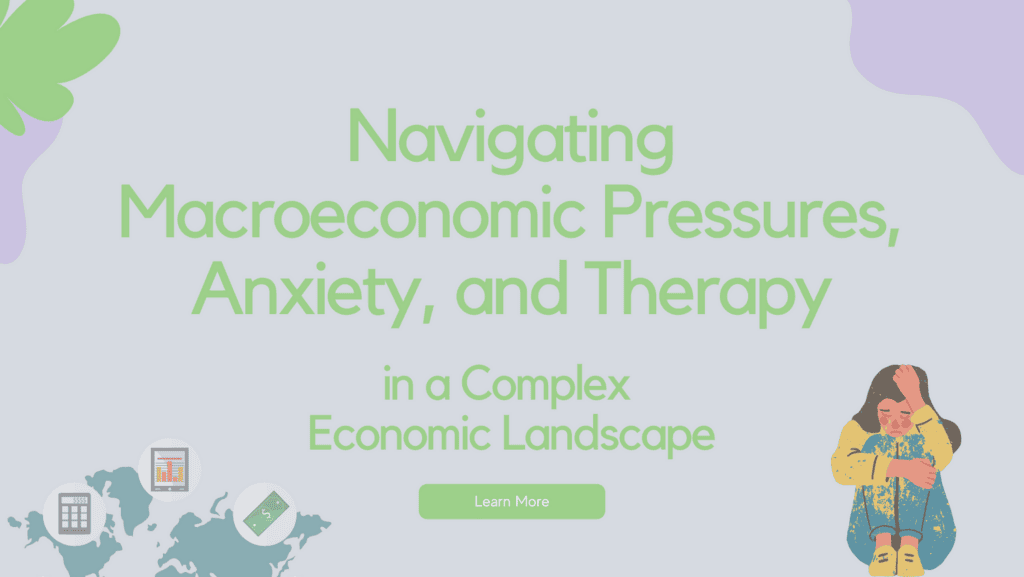In today’s world, we are constantly bombarded with conflicting information about the economy. On one hand, we see strong economic indicators like low unemployment rates, the creation of 12 million new jobs since 2021, and historically low numbers of people filing for unemployment. On the other hand, we face high inflation, warnings of a recession, big corporations announcing layoffs, and a growing economic inequality, especially since the pandemic. As a result, 50% of Americans report feeling anxious about the economy, and “money stress” is at its highest since 2015.
It’s no surprise, then, that many people are struggling with the macroeconomic pressures they face. Even those who are financially secure can experience stress and anxiety about financial decisions concerning family or business. The economic climate is complex and rapidly changing, and it’s difficult to know which direction to turn for advice.
Introduction to Macroeconomic Pressures and Anxiety
When patients come to therapy expressing economic-related anxiety, it is crucial for therapists to understand the specific nature and etiology of this anxiety. Therapists must also be aware of their own personal optimism or pessimism about the economy, as well as any assumptions about a client’s economic situation based on their job title or income. Instead, therapists must help patients understand the root cause of their anxiety and how it relates to macroeconomic pressures.
Economic anxiety can manifest in many ways, from physical symptoms like heart palpitations or digestive issues to psychological signs such as irritability and difficulty concentrating. Some of the most common causes of economic anxiety include:
• Fear of job loss or salary cuts
• Worry about making ends meet or accumulating debt
• Uncertainty about the future of the economy
• Inability to save for retirement or other long-term goals.
Exploring the Effects of Feeling Poor and Perceived Affluence
Research shows that when people feel poor, regardless of their actual financial situation, they act in their short-term interests and exhibit risk-taking behavior. As therapists, we need to engage with empathy and curiosity with clients who feel that they are barely getting by, living paycheck to paycheck, and constantly comparing themselves to their seemingly more successful neighbors.
It is important to acknowledge that people who perceive themselves as being on a lower “rung” of affluence are more likely to suffer from depression, anxiety, and chronic pain. They are also more prone to making bad decisions, underperforming at work, and experiencing health issues like obesity and heart problems.
Exploring the Effects of Feeling Rich and Perceived Powerlessness
Conversely, people who feel rich may experience a sense of powerlessness because their wealth or success does not necessarily guarantee them happiness or security. They can become overwhelmed by the complexities of managing their finances, making long-term investments, or developing financial plans for retirement. They may also feel a sense of guilt or shame when they don’t know how to use their wealth in a meaningful way, or lack the resources to help others.
Understanding Clients’ Struggles in the Context of Systemic Problems
Many clients struggle with systemic problems that contribute to their economic anxiety. They may work full-time yet still worry about providing for their families. Some clients face the threat of being laid off or losing their jobs to AI technology. Couples often struggle with childcare costs, and long commutes can leave individuals feeling depleted.
The Importance of Therapist’s Personal Experience and Empathy
Recognizing these problems as systemic, rather than purely personal, can be the first therapeutic step. As someone who experienced a layoff in 2022, I can empathize with clients and help them cultivate self-compassion. This experience taught me the importance of acknowledging and validating clients’ feelings and reducing self-blame.
Incorporating mindfulness practices can help clients reduce anxiety and depression. Normalizing their experiences can also be helpful, as many people cope with economic anxiety through unhealthy activities like smoking, drinking, gambling, or emotional eating. Understanding that economic anxiety can lead to conflict with loved ones and that large-scale layoffs are beyond their control can alleviate some of the burden.
Cognitive Reframing and Alternative Perspectives
Cognitive reframing is another essential therapeutic tool. Encouraging clients to consider alternative perspectives on their situation, such as viewing job dissatisfaction or a layoff as an opportunity for growth, can be empowering. Therapists can also help clients collaborate with co-workers to brainstorm collective changes in the workplace.
Certified Career and Resume Strategist Sweta Regmi advises those who have experienced a recent layoff to take time to grieve and heal, acknowledging their emotions and not rushing back into the workforce, if possible. Therapy can provide a space for individuals to gain a different perspective on their situation, realize they are not alone, and engage in the grieving, healing, and self-compassion necessary for moving forward.
To manage economic anxiety, clients can benefit from developing a financial plan, setting realistic goals, expanding social support networks, and seeking professional guidance from financial advisors or career counselors. Participating in systemic change efforts, like advocating for fair wages, affordable housing, access to quality education, corporate responsibility and sustainable business practices, can also help alleviate one’s economic anxiety.
Treating Macroeconomic Pressures and Anxiety in Therapy
The goal of therapy is to help patients make sense of their anxiety, develop productive coping strategies, and find hope for the future. To do this, therapists must take an individualized approach to each client’s situation.
Therapists can start by helping the patient identify what is causing their anxiety, and understand the various macroeconomic forces at play. Educating patients on economic topics such as inflation, interest rates, stock market volatility, and global economic trends can provide them with a better understanding of the issues they face and reduce self-blame.
The Role of Therapy in Addressing Macroeconomic Pressures and Anxiety
In conclusion, the complex relationship between macroeconomic pressures, anxiety, and therapy calls for a multifaceted approach. Mental health professionals play a critical role in supporting clients through economic uncertainties by understanding the specific nature of their anxiety, validating their emotions, and offering practical strategies for coping.
First, it is essential for therapists to stay informed about the economic landscape and be aware of their own biases and assumptions. This will enable them to provide a more accurate and empathetic understanding of the challenges faced by their clients.
Second, addressing both individual and systemic factors is crucial for promoting overall well-being. By recognizing the interplay between personal struggles and larger economic forces, therapists can help clients differentiate between the issues they can control and those that require broader societal change.
Third, incorporating various therapeutic techniques, such as mindfulness practices, cognitive reframing, and grief work, can assist clients in managing their anxiety and developing resilience in the face of economic uncertainty. By fostering a safe space for exploration, reflection, and healing, therapists can support clients in processing their emotions and finding new perspectives on their situation.
Lastly, advocating for systemic solutions is an essential aspect of addressing economic anxiety. Mental health professionals can contribute to public discourse and policy discussions by highlighting the mental health implications of economic inequality, promoting fair wages, affordable housing, and access to quality education. Encouraging corporate responsibility and sustainable business practices can also contribute to a more equitable society, ultimately reducing the prevalence of economic anxiety.
In summary, navigating the intricate relationship between macroeconomic pressures, anxiety, and therapy requires mental health professionals to adopt a comprehensive and empathetic approach. By addressing both individual and systemic factors, therapists can support clients through economic uncertainties and contribute to building a more just and inclusive society.





